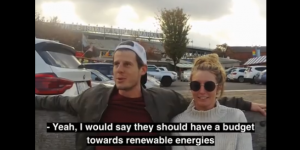In order to create the videos for Envirovote2019, we wanted to interview average Canadians and political candidates to present an unbiased representation of feelings towards climate change before the federal election. Creating easily understood clips from interviews was a long and complicated process.
To start with, all of the group members did research on issues related to climate this election. When we brought this research together, we had over 50 questions, some of which were complex and specific. One of my teammates, Nicole, and I cut down that list of 50 questions into 5 questionnaires. We made one questionnaire for each party and one for the public. The contents were generally the same, although we altered the party ones to address specific policies or past decisions.
The politicians who agreed to be interviewed were prepped ahead of time because we sent them the questionnaires. However, the public was a different story. In order to get interviews, we had to simply stop people on the street and ask if they wanted to be interviewed. This started as a whole team effort and we slowly became comfortable enough to do it in groups of 2.
Over the month we spent filming, we learned that it's easier to interview people on the UBC campus or in areas of Vancouver that are not business districts, and that people are more likely to answer when they are sitting down. I learned how to set up the mics and how to frame the shots, so that the interviewees could be clearly seen. We got better at delivering clear and precise questions that people could answer quickly.
Once all of this was done and uploaded to google drive, I took on the task of transcribing all these interviews. I had to write down each word of each interview. This was a time consuming and complicated process. However, I became very comfortable with this skill and hope to be able to use this future.

This experience gave practical skills in documentary-style interviewing. The skills of interviewing and transcription will serve me well.